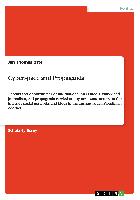- Start
- Cyberspace and Propaganda
Cyberspace and Propaganda
Angebote / Angebote:
Scientific Essay from the year 2009 in the subject Politics - International Politics - Topic: Peace and Conflict Studies, Security, Princeton University (Woodrow Wilson School for Public Affairs and International Relations), 53 entries in the bibliography, language: English, abstract: The catalyst and vehicle in domestic warfare and guerilla combat (not the cause) has always been technological revolution: the Cyberspace. Today, at least since the Al Qaida attacks at 9/11, technology is profoundly affecting the soveignty of governments, the world economy, and military strategy. Without doubt, information has often made the difference between victory and defeat. As a consequence, any efforts of governments in crisis diplomacy to stop others from interfering in its affairs, is rapidly eroding.
Experiencing the current weakness of International Relations, United Nations and European Union, the ethnic, political, and religious diversity in the Gaza has given a strong foundation to the militant wings of Hamas inside the Gaza strip. Hamas not only conducts militant wings, but also runs extensive social networks. Whether in New York, Washington D.C., Berlin or Jerusalem: politicians are depended on what they read in their intelligence reports. Journalism correspondents find themselves in a system of embedded journalism both by the Israeli government and Palestinian Hamas, which restrict them to show no more than censored news.
Finally, behind the individual's eyeglasses in Europe and the US, every citizen is touched from what he intermediate sees online in his living room. Even the big problem of IR turns out in Gaza's living rooms: The viewers of propaganda are more likely to vote with their remote controls than by further reasoning. Since its foundation the cyberspace enables extended personal and organizational interactions through many political, religious and economical borders in the World.
None-state actors like militant splinter groups of Hamas might take over the negotiation power. The internet may become known as the strongest force in IR. Through the upraise of the internet, self-determined online communities and prominent social networks like Youtube, Facebook, and Second Life, but also thousands of independent blogs and open-source-servers have emancipated millions of web developers and bloggers.
Being a victim of victims, it cannot be easy to negotiate any peace solution for Gaza on a neutral level with both Israelis and Palestinians. The growing use and manipulation of modern communications by terrorist organizations on more than 5.000 militant websites, online forums, and chat rooms serving terrorists and their supporters, urges IR...
Folgt in ca. 5 Arbeitstagen




